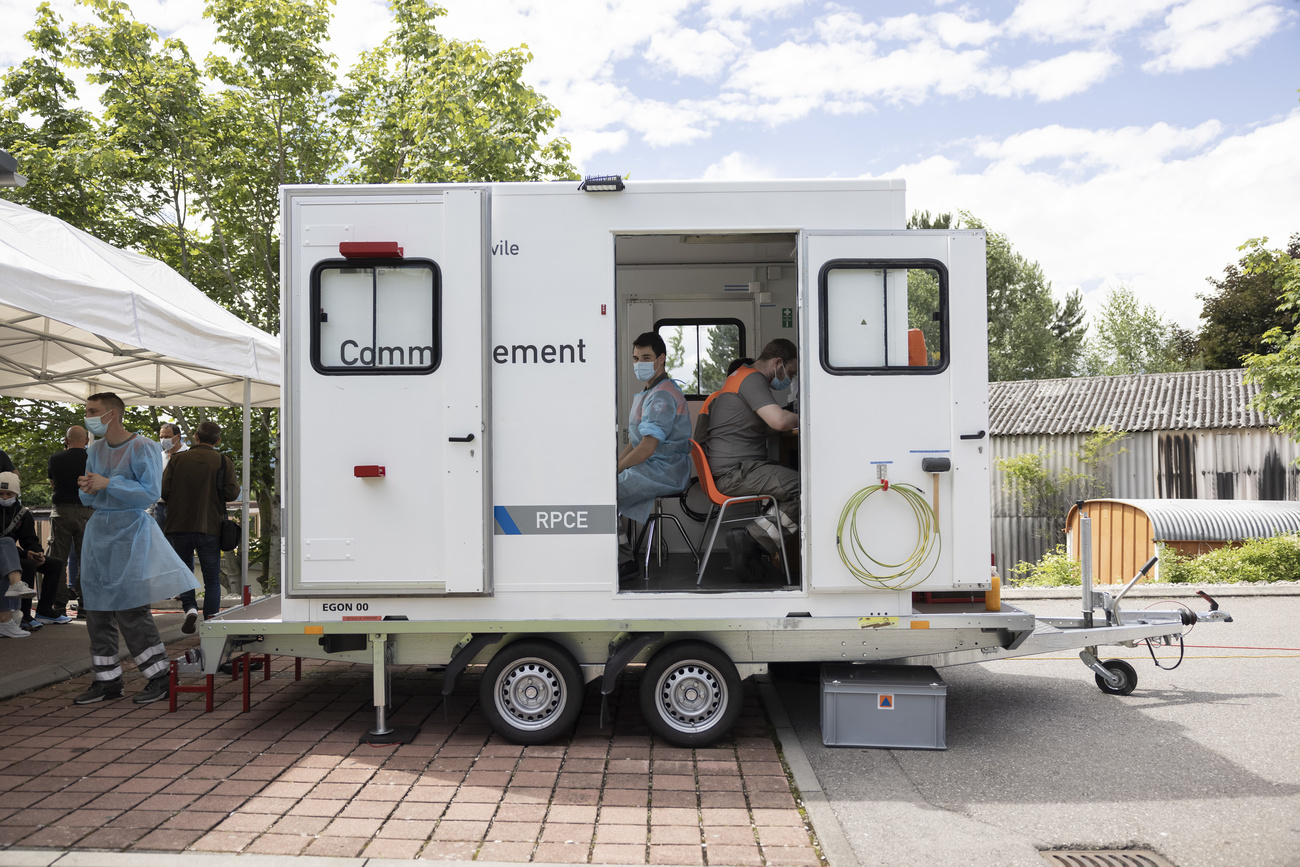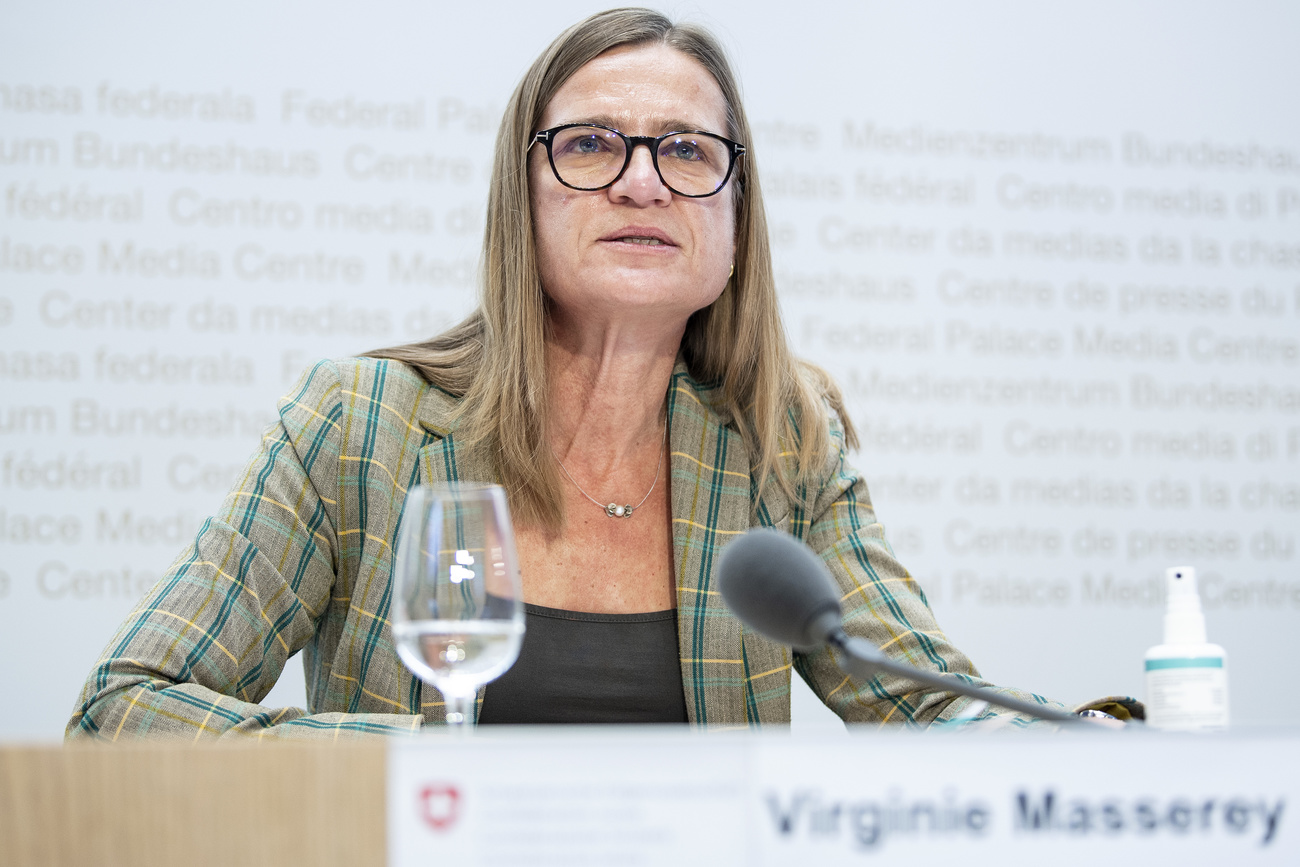
How the Swiss could reverse a dip in Covid vaccinations

Switzerland, like many countries, is struggling to maintain a momentum in vaccinating its population. Yet health officials are reluctant to introduce more coercive measures to convince the undecided to get the jab.
Late June was a good time for the Swiss to let their hair down. With the weather improving and large gatherings once again permitted, many people hit the bars to watch European Championship football matches. Others packed their bags for long-delayed holidays.
Virginie Masserey, head of infections control at the Federal Office of Public Health (FOPH), concedes that vaccination was probably far from some people’s mind at that point.
“Many might have thought they could just enjoy life – that they were safe now that the numbers were low,” said Masserey, who is coordinating the national vaccination drive.
By early July, the number of Covid-19 jabs had dropped from 90,000 a day to 60,000. At this writing, just over 40% of the population is fully vaccinated. New cases, meanwhile, have crept up after a significant drop, with daily numbers reaching 500 by mid-July and the more contagious Delta variant accounting for a growing proportion of these.

Masserey is not surprised by this turn of events.
“We’ve observed in other countries too that around the 50% coverage mark, there starts to be some slowing down in the will to be vaccinated,” said the health official, who regularly appears at government press conferences on the pandemic.
“But it’s only a slowing down.”
Boosting listless campaigns
With the World Health Organization predicting that the Delta variant will soon become the dominant strain of the virus, many governments are ramping up their vaccination drives. Israel, one of the first nations to start vaccinating its citizens, saw a sharp increase in new cases in June and is now targeting adolescents for vaccinations. In Europe, more shots are being administered following renewed campaigns in The Netherlands, Norway and Spain, Reuters reports.
Although a recent survey showed that 25% of people in Switzerland do not plan to get the Covid vaccine, Masserey is optimistic the will is there.
“You can look at it the other way – 75% can be convinced to be vaccinated,” she said, adding that, if achieved, this would represent “very good” coverage overall. Some 80% of people 65 and over are fully vaccinated. Among younger groups there is anecdotal evidence that they can be convinced, especially by their peers, to get the shot, said Masserey.

More
Newsletters
The aim of vaccination is not herd immunity – “we live in a connected world, so it’s impossible to have a goal of eliminating the virus,” she said – but to prevent as many deaths and hospital stays as possible.
To do this, there are no indications that Swiss officials plan to offer positive incentives – give-aways, such as lottery tickets being handed out in the United States. Nor will they take coercive measures like the French, who recently announced mandatory vaccination for people working in healthcare settings.
“Why [target] healthcare workers?” said Masserey. “It’s important for everybody to be vaccinated.”
The National Biomedical Ethics Commission has advised against compulsory jabs, its president telling Swiss public radio SRF it “would not be the right thing to do” given that alternatives, such as regular testing of health workers, exist to protect patients.
According to Masserey, some hospitals have already found effective ways to encourage vaccination, for example by getting trusted experts to answer staff’s questions.
The FOPH itself has focused on sharing factual information throughout its advertising campaign and is sticking to this strategy.
“Anecdotally, we hear this is the best way,” said Masserey. Her office is distributing information sheets, posters and videos that emphasise the benefits of the vaccine to the cantons, which are responsible for vaccinating the population.
The FOPH campaigns also target specific groups, including young women on social media who may be worried about the effects of the vaccine on fertility. The office is also preparing messages to remind people returning from summer holiday to get their shots.
Closer to the people
One method adopted by the French that the Swiss have not yet ruled out is to make the Covid certificate more broadly applicable in public places. In Switzerland the certificate, which shows a person is fully vaccinated or has a negative test result, is currently needed to enter dance clubs and gatherings of more than 10,000 people.
“If we consider [broadening this], it would be to reduce the spread of the virus” rather than to improve vaccine coverage, said Masserey. “Of course, it would have a secondary effect of encouraging more vaccinations.”
France registered a spike in vaccination appointments – over one million in the space of 24 hours – after announcing mandatory shots for health workers as well as the need to have a Covid pass to enter restaurants and cafes.
Some Swiss cantons are experimenting with other novel strategies. Aargau, Schwyz and Vaud all opened mobile vaccination centres in recent weeks. In Geneva a pharmacy that began offering walk-ins in early July has seen people line up for up to two hours to get their shot, public television RTS reported.

More
Coronavirus: the situation in Switzerland
Getting closer to the people is not just about bringing the vaccine to people’s doorstep. According to Masserey, it’s also about trusted members of the community having direct contact with the population.
“Doctors have told us that it takes them five minutes to convince patients who come to them because they’re hesitating [to get the vaccine],” she pointed out.
Uneven vaccination coverage
The fact that cantons are individually responsible for vaccination, however, has led to disparities in coverage across the country.
“Each canton is different, so it’s logical that each will design responses and interventions that are appropriate for their populations and settings,” Masserey said. The job of her office is to encourage cantonal officials to examine data at the local level and “see where they have pockets of unvaccinated people that they can target.”
Masserey is not certain the progression of the Delta variant will lead to an important increase in hospital stays, as the national Covid science taskforce is warning, pointing to the situation in the United Kingdom.
“Is it only unvaccinated people that are being hospitalised? Are there vaccine failures?” she asked, pointing out that many people in the UK have received the Astra Zeneca vaccine, which has not been approved in the Alpine country.
“We don’t have enough information about what’s driving this increase and whether we can transfer [this experience] to Switzerland.”
For the infections expert, the current rise in cases and the spread of the Delta variant in the country could even have an upside – prompting people who have so far hesitated to finally get the shot.
More

In compliance with the JTI standards
More: SWI swissinfo.ch certified by the Journalism Trust Initiative






























You can find an overview of ongoing debates with our journalists here . Please join us!
If you want to start a conversation about a topic raised in this article or want to report factual errors, email us at english@swissinfo.ch.